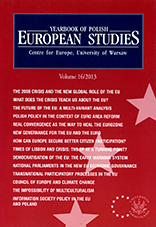The 2008 Crisis and the new role of the European Union in the global arena
The 2008 Crisis and the new role of the European Union in the global arena
Author(s): Bogdan GóralczykSubject(s): Politics / Political Sciences
Published by: Centrum Europejskie Uniwersytetu Warszawskiego
Summary/Abstract: The process of European integration has not been finalised by a so-called finalité politique i.e. a supranational entity, probably in form of a federation. This entity, expected to play an independent and crucial role in the global arena, is still not created yet. At the same time, the crisis on global markets in 2008 and its aftermath has created many new and unprecedented challenges. Crisis as such is nothing new in the history of European integration, in fact it has been stated that real progress went ‘from crisis to crisis’ (J.Delors). This means that only new challenges push forward the whole machinery. The situation after 2008 is different however, as at this moment the European Union is challenged by a multilayer crisis. Namely, the EU currently has problems with: 1) Leadership and strategic vision; 2) Economic crisis in the Eurozone, together with overwhelming domestic debts in the so-called PIGS countries, mainly of the Mediterranean region; 3) Institutions (the ‘democratic deficit’), and even 4) Axiology, i.e. a common system of values, which are being frequently and openly challenged in many Member States by various political forces. Thus the EU today, in the middle of the second decade of the twenty-first century, is staying just in front of the threshold, or rather a fault-line, and faces a cardinal dilemma: how to deepen integration, including the crucial CFSP, amongst a growing tide of renationalisation? One thing seems to be obvious, however. The longer will be the crisis (multi-layered!), the greater will be the opportunities for anti-integration forces and processes. Only strong leadership with a reformist agenda can bring us out of this Catch-22 situation. Without courage and vision, the EU may be doomed to become an ‘economic giant and political pygmy’ again. Is that the status we wish as we face the challenges from the so-called emerging markets and in an era when a new balance of (economic) power is also emerging after 2008?
Journal: Yearbook of Polish European Studies
- Issue Year: 2013
- Issue No: 16
- Page Range: 15-40
- Page Count: 26
- Language: English

